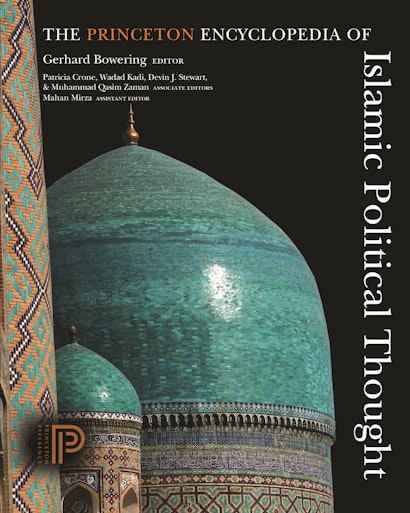The first encyclopedia of Islamic political thought from the birth of Islam to today, this comprehensive, authoritative, and accessible reference provides the context needed for understanding contemporary politics in the Islamic world and beyond. With more than 400 alphabetically arranged entries written by an international team of specialists, the volume focuses on the origins and evolution of Islamic political ideas and related subjects, covering central terms, concepts, personalities, movements, places, and schools of thought across Islamic history. Fifteen major entries provide a synthetic treatment of key topics, such as Muhammad, jihad, authority, gender, culture, minorities, fundamentalism, and pluralism. Incorporating the latest scholarship, this is an indispensable resource for students, researchers, journalists, and anyone else seeking an informed perspective on the complex intersection of Islam and politics.
- Includes more than 400 concise, alphabetically arranged entries
- Features 15 in-depth entries on key topics
- Covers topics such as:
Central themes and sources of Islamic political thought: caliph, modernity, knowledge, shari’a, government, revival and reformModern concepts, institutions, movements, and parties: civil society, Islamization, secularism, veil, Muslim BrotherhoodIslamic law and traditional Islamic societies: justice, taxation, fatwa, dissent, governance, piety and asceticism, trade and commerceSects, schools, regions, and dynasties: Mu’tazilis, Shi’ism, Quraysh, Mecca and Medina, Baghdad, Indonesia, Nigeria, Central Asia, OttomansThinkers, personalities, and statesmen: Mawardi, Shafi’I, Saladin, Tamerlane, Akbar, Atatürk, Nasser, Khomeini- Contains seven historical and contemporary maps of Muslim empires, postcolonial nation-states, populations, and settlements
- Guides readers to further research through bibliographies, cross-references, and an index
Awards and Recognition
- One of Library Journal's Best Reference of Law & Politics for 2012
- Winner of the 2013 Cover/Jacket Merit Award in the Professional, Reference category, New York Book Show
- One of Choice's Outstanding Academic Titles Top 25 Academic Books for 2013
"[A] work of high-quality erudition packaged in an accessible manner which will benefit a wide readership, the PEIPT is thus also quintessentially of its time and a political statement of sorts in itself, which is, perhaps paradoxically, where its deeper value as a point of reference will ultimately lie."—Zaheer Kazmi, Times Literary Supplement
"In this timely volume, 15 major entries examine key topics such as Muhammad, jihad, gender, fundamentalism, and pluralism. The remaining nearly 400 entries focus on the origin and evolution of Islamic political terms, concepts, personalities, movements, places, and schools of thought."—Library Journal
"This unprecedented encyclopedia aims to be a comprehensive, authoritative, innovative reference covering 14 centuries while demonstrating its utility to comprehend today's political and cultural situation in Islamic societies. It is a truly impressive opus."—Choice
"[T]he editors of EIPT have done a marvelous and stunning job by bringing out such an all-inclusive and rich volume on the various aspects, trends and perspectives, of Islamic political thought. Taken as a whole, this work is quite a comprehensive and concise guide, providing positive and reasonably balanced views on a wide range of topics relating to Islam and politics. It could also be recommended for use as an essential and International important reference guide; a must read for everyone interested in Islamic political thought. And keeping in view the richness and comprehensiveness, lucidness and coherence, wide-ranging and diverse approach and nature of the entries, as well as the integration of the latest scholarship, EIPT is not only one of the most essential but is a must-have and must-read reference work both for the students and specialists of Islamic political thought in particular and a best one volume comprehensive work that brings together concepts and issues, personalities and movements, for undergraduates and graduates of Islamic studies in general."—Tauseef Ahmad Parray, World Journal of Islamic History and Civilization
"[T]his volume is almost unbelievably affordable. . . . Professors can afford to have a copy of their own, and every academic library should purchase one without delay. . . . [H]ighly recommended."—Paula Skreslet, Theological Librarianship
"Written by an international team of specialists, the entries make use of the latest research and provide useful recommendations for further reading and research through bibliographies, cross-references and an index. This first Encyclopedia of Islamic Political Thought constitutes a resourceful guide for students, researches, journalists, diplomats and anyone looking for information on the complex subject of Islam and politics."—Lisa Kaaki, Arab News
"[B]y incorporating the latest scholarship and providing a clear path through the contemporary Islamic weltanschauung, this Princeton Encyclopedia will be a valuable resource for students, researchers, journalists, and anyone else seeking an informed perspective on contemporary politics in the Islamic world, and beyond."—Bob Duckett, Reference Reviews
"Incorporating the latest scholarship, this is an indispensable resource for students, researchers, journalists, and anyone else seeking an informed perspective on the complex intersection of Islam and politics."—World Book Industry
"[T]his work is a fully developed research project that is able to meet the expectations of enthusiastic scholars of Islamic studies, politics and modem history."—Majid Daneshgar, Political Studies Review
"[E]ncyclopedic in its scope and presents one of the most authoritative overviews of the topic published in recent years."—Jørgen S. Nielsen, Islam and Christian-Muslim Relations
"The work offered to us here by Professor Böwering and his distinguished associate editors is very welcome indeed. . . . A very useful contribution to the field. . . . A convenient and reliable first reference, and through its longer articles a good means of finding one's way through the complexities of Islamic political discourse over the last fourteen centuries."—R. Stephen Humphreys, Bulletin of the School of Oriental and African Studies
"This is a comprehensive and authoritative encyclopedia of Islamic political thought from the birth of Islam in the seventh century to the current period. . . . Highly recommended as an indispensable reference resource on Islamic political thought in general and on terrorism-related subjects in particular."—Perspectives on Terrorism

